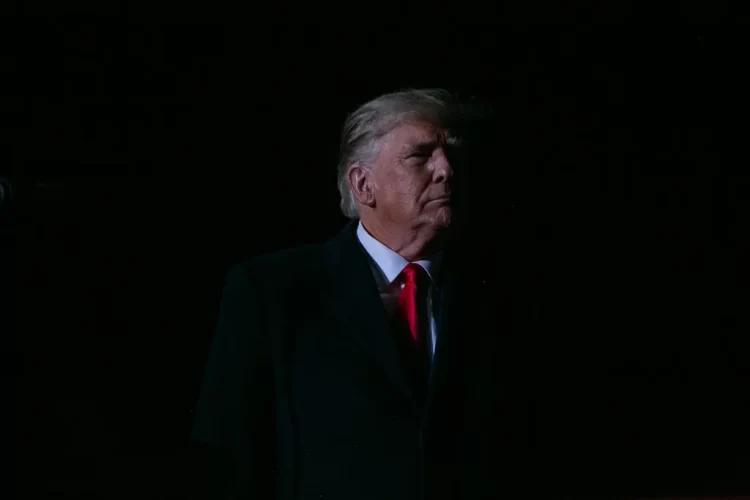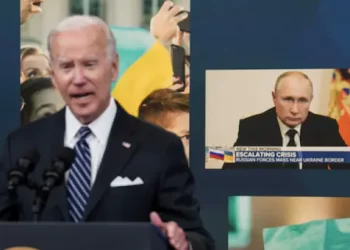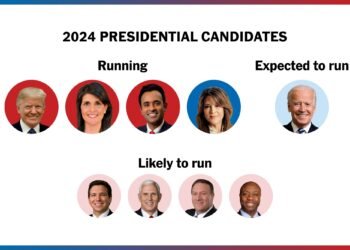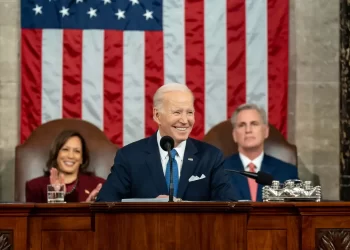- Those who have spent time with Donald Trump recently claim that he frequently seems remarkably removed from the gravity of his possible legal problems.
- The case in Manhattan is one of four criminal investigations facing former President Donald J. Trump as he runs again for the White House.
By Maddie McGarvey for The New York Times
Donald J. Trump claims he is ready for his perp walk.
The former president has said to friends and colleagues in private conversations at Mar-a-Lago that he welcomes the thought of being paraded by the police in front of a crowd of reporters and news cameras. He has reportedly openly considered whether to smile for the collected journalists, thought about how the general people might react, and hailed the prospective spectacle as a good time.
No one is quite sure whether his remarks are bravado or genuine resignation about what lies ahead.
If he is truly looking forward to it, he might be disappointed.
There is no indication, even if Mr. Trump is charged, that the authorities would have him take part in that storied New York City law-enforcement tradition known by detectives and crime reporters alike — walking the newly arrested past a cluster of journalists. If Mr. Trump is indicted and surrenders voluntarily, arrangements are likely to be made between the Secret Service and law enforcement to avoid a media circus.
Another person who has spoken with Mr. Trump, who was not authorized to speak publicly, said the former president was less concerned with the particulars of where he would be seen than with being assured of the opportunity to show the public he is not slinking away in shame.
As he waits for a likely criminal indictment — making him the first current or former American president to face criminal charges — Mr. Trump has often appeared significantly disconnected from the severity of his potential legal woes, according to people who have spent time with him in recent days. He has been spotted zipping around his Palm Beach resort in his golf cart and on one recent evening acted as D.J. at a party with his personally curated Spotify playlists, which often include music from the Rolling Stones to “The Phantom of the Opera.”
When Mr. Trump has focused on the case — one of four criminal investigations in Georgia, New York and Washington now facing the front-runner for the Republican Party’s presidential nomination — he has concentrated on projecting strength and avoiding any signals of shame over his circumstances, an approach that mirrors his handling of repeated political crises and his flair for creating dramatic, made-for-TV moments. Seeing Mr. Trump after a court appearance could also galvanize his supporters, whom Mr. Trump urged over the weekend to protest in the event of his arrest.
“He wants to be defiant — to show the world that if they can try to do this to him, they can do it to anyone,” said one person who spoke to Mr. Trump over the weekend.
Who’s Running for President in 2024?
The race begins. Four years after a historically large number of candidates ran for president, the field for the 2024 campaign is starting out small and is likely to be headlined by the same two men who ran last time: President Biden and Donald Trump. Here’s who has entered the race so far, and who else might run:
Donald Trump
The former president is running to retake the office he lost in 2020. Though somewhat diminished in influence within the Republican Party — and facing several legal investigations — he retains a large and committed base of supporters, and he could be aided in the primary by multiple challengers splitting a limited anti-Trump vote.
Nikki Haley
The former governor of South Carolina and U.N. ambassador under Trump has presented herself as a member of “a new generation of leadership” and emphasized her life experience as a daughter of Indian immigrants. She was long seen as a rising G.O.P. star but her allure in the party has declined amid her on-again, off-again embrace of Trump.
Vivek Ramaswamy
The multimillionaire entrepreneur and author describes himself as “anti-woke” and is known in right-wing circles for opposing corporate efforts to advance political, social and environmental causes. He has never held elected office and does not have the name recognition of most other G.O.P. contenders.
President Biden
While Biden has not formally declared his candidacy for a second term, and there has been much hand-wringing among Democrats over whether he should seek re-election given his age, he is widely expected to run. If he does, Biden’s strategy is to frame the race as a contest between a seasoned leader and a conspiracy-minded opposition.
Marianne Williamson
The self-help author and former spiritual adviser to Oprah Winfrey is the first Democrat to formally enter the race. Kicking off her second presidential campaign, Williamson called Biden a “weak choice” and said the party shouldn’t fear a primary. Few in Democratic politics are taking her entry into the race seriously.
Others who are likely to run. Gov. Ron DeSantis of Florida, former Vice President Mike Pence, former Secretary of State Mike Pompeo, Senator Tim Scott of South Carolina and Gov. Chris Sununu of New Hampshire are seen as weighing Republican bids for the White House.
A Trump campaign spokesman did not respond to a request for comment.
Trump has been both invigorated and angered by the prospect of being arrested, according to those who have spoken with him. And he has also entertained a certain amount of magical thinking.
For decades, according to people who worked with him years ago at the Trump Organization, Trump — who was first criminally investigated in the 1970s — was plainly frightened of being arrested. He spent years cultivating officials who might have influence over investigations into him or his company.
Supporters of Trump outside his Mar-a-Lago resort in Florida waved red, white and blue flags reading “Trump: Save America” and “Don’t Blame Me, I Voted for Trump.”
He has discussed the prospect that his recent pressure campaign — a series of personal, unproven and provocative attacks he has unleashed against investigators, Democrats and fellow Republicans — might persuade Alvin L. Bragg, the Manhattan district attorney, to walk away from the case.
That notion, according to legal experts, is highly unlikely, but Mr. Trump has a long history of believing he can bend external events to his will, and has sometimes succeeded.
Bragg, who was a senior official in the New York attorney general’s office that brought a bevy of lawsuits against Mr. Trump’s administration, has publicly stated that his legal decisions would not be swayed by politics.
Trump has a history of emerging from political scandals that would have ruined most traditional politicians.
Even before Mr. Trump was elected, in October 2016, The Washington Post made public an outtake of Mr. Trump doing an interview with “Access Hollywood” a decade earlier and boasting about grabbing women’s genitals without their consent. As Republicans called for him to drop out that weekend, Trump’s impulse was to go to the street, where dozens of his supporters had gathered, and immerse himself in the crowd.
And then years later in 2021, Trump sulked about his political future inside Mar-a-Lago. He had just been impeached for a second time, after his supporters rioted at the Capitol in an attempt to overturn his election defeat. People who spent time with him in those first post-White House months described a startling melancholy in his tone and hints of self-reflection as he sighed about his advanced age and expanding waistband.
“The Good Lord’s given me good health up to now — but you never know,” he told one person at the time.
But Trump slowly found relief in a new routine, playing 36 holes of golf a day and timing his arrival at dinner on the Mar-a-Lago terrace with nightly standing ovations from dues-paying members who were already seated. By June, Trump had again started hosting his signature campaign-style mega-rallies.
Two years later, Trump has not only defied the expectations of many who believed he would never again seek public office, but he has also emerged as the strong favorite to win his third consecutive Republican presidential nomination.
The experience has intensified Mr. Trump’s confidence in his old playbook, and his aides view the pending indictment — and the potential for more to come — as an asset for the campaign as they use the investigations to increase fund-raising and watch as primary rivals walk a careful line between criticizing prosecutors and backing Trump.
Trump has again demonstrated his grip on Republican voters. But questions remain about whether his time-tested methods of galvanizing his supporters are worth the political costs he has paid with independent swing voters and moderate Republicans.
These voters have turned on Trump, as well as many of the candidates and causes he has backed, for three consecutive election cycles that have ended in disappointment for his party.
Trump, for now, appears content to follow his own formula for crisis communications, a method that eschews long-term planning for short-term gains. Mr. Trump has long emphasized the importance of winning the next headline at virtually any cost and with little regard for what happens next.
On Saturday morning, Mr. Trump set off a frenzied news cycle by announcing on social media that he would be arrested within three days. Mr. Trump then visited one of his nearby golf courses, leaving his team to clarify that he had no direct knowledge of the timing of an arrest.
By Saturday afternoon, Trump escaped the controversy by flying to the exact location of another past political humiliation: the BOK Center in Tulsa, Okla., where a sparse crowd attended his first pandemic-era rally on June 20, 2020.
This time, on Saturday, Mr. Trump was not standing apart from the crowd but rather walking among it, his dark blue suit and red tie contrasting with a crowd outfitted mostly in T-shirts, hoodies and sports jerseys to watch the N.C.A.A. Division I wrestling championships.
He chatted with wrestlers after their matches, met a few coaches and entertained a few brief chants in his honor — a performance aimed at showing swagger and masking any concern about a pending arrest.
“He’s entirely focused,” one staff member remarked, “on the wrestlers.”
Jonathan Swan and Ben Fenwick contributed reporting.
Michael C. Bender is a political correspondent and the author of “Frankly, We Did Win This Election: The Inside Story of How Trump Lost.” @MichaelCBender
Maggie Haberman is a senior political correspondent and the author of “Confidence Man: The Making of Donald Trump and the Breaking of America.” She was part of a team that won a Pulitzer Prize in 2018 for reporting on President Trump’s advisers and their connections to Russia. @maggieNYT























